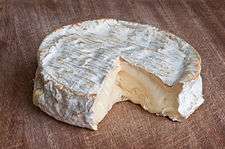Coulommiers cheese
| Coulommiers | |
|---|---|
 | |
| Country of origin | France |
| Region | Coulommiers |
| Source of milk | Cows |
| Pasteurised | yes or no |
| Texture | Soft |
| Dimensions | 13 cm (5.1 in) |
| Weight | 12 oz (340 g) |
| Aging time | 3-8 weeks |
|
| |
Coulommiers is a soft ripened cheese from Coulommiers in the Seine-et-Marne department of France.[1][2][3] It is made from cow's milk, and is usually in the shape of a disc with white, bloomy, edible Penicillium candidum rind.[4] When produced as an artisanal or "farmhouse" cheese from unpasteurised milk, it has some reddish blush in parts of the rind. The period of ripening when made of pasteurised whole milk is about four to six weeks.[5] The fat content is 40 per cent.[6][7][8][9][10][11][12]
Coulommiers is a lesser-known cousin of Brie, although it has been produced for longer.[6][13] It is smaller and thicker than Brie and with a nuttier flavour, but otherwise has similar characteristics, with a similar buttery colour and supple texture. The cheese may be either farmer-made or industrially produced; however, the industrial version lacks the depth of an unpasteurized cheese. Because it is not an AOC cheese, producers can make it with pasteurized milk and ship it to the United States.[6]
History
In 1930, there were 250 cheesemakers coming from Coulommiers, selling their cheese to “affineurs” at the Coulommiers market every Wednesday. In 1946, affineurs started to make cheese. Meanwhile, the number of cheesemakers declined, they were only 60 left in 1946. They were all making brie de Coulommiers (by definition) of different sizes, but only the specific size, diameter 13 to 15 cm (5.1–5.9 in), was unique to the Coulommiers market. Today, this cheese is commonly called Coulommiers. In 2009, local councillors led by the Franck Riester, Deputy Mayor, and journalists launched the PDO project to raise the importance of a unique Coulommiers cheese.[14]
References
- ↑ "coulommiers". cheese-library.com. Retrieved 2013-09-13.
- ↑ "Viva La France" (PDF). eucenter.tamu.edu. Retrieved 2014-07-29.
- ↑ Doanne, C.F.; Lawson, H.W. (1911). U.S Department of Agriculture, Bureau of Animal Industry - Bulletin 146: Varieties of Cheese: Descriptions and Analyses. Washington, D.C, USA: US Government Printing Office. p. 18. Retrieved 2014-07-29.
- ↑ "COULOMMIERS TRUFFE (Truffled Coulommiers)" (PDF). rhcl.com.au. Retrieved 2014-07-29.
- ↑ Marcellino, N. (2001). "Diversity of Geotrichum candidum Strains Isolated from Traditional Cheesemaking Fabrications in France" (PDF). aem.asm.org. Retrieved 2014-07-29.
- 1 2 3 Janet Fletcher (2011-08-31). "Try French Brie's little sister, Coulommiers". sfgate.com. Retrieved 2013-09-13.
- ↑ "Coulommiers". cheeseonline.fr. Retrieved 2013-09-13.
- ↑ "Dairy Foods". drinc.ucdavis.edu. Retrieved 2013-09-13.
- ↑ "Cheeses of France". lowell.edu. Retrieved 2013-09-13.
- ↑ "Cheese" (PDF). suu.edu. Retrieved 2013-09-13.
- ↑ "MANUFACTURED CHEESE PRODUCTS" (PDF). foodsafety.unl.edu. Retrieved 2013-09-13.
- ↑ "Items to be Included in a Food Safety Handbook for Artisan Cheese Makers". digitalcommons.usu.edu. 2013-04-01. Retrieved 2014-07-29.
- ↑ "Farmers' Weekly Review, 9 June 1966: French Cheese and Fruit". idnc.library.illinois.edu. 1966-06-09. Retrieved 2014-07-29.
- ↑ "PDO for Brie de Coulommiers – Let it Brie?!". cheesesolidarity.wordpress.com. 2011-05-13. Retrieved 2013-09-13.
External links
| Wikimedia Commons has media related to Coulommiers (cheese). |